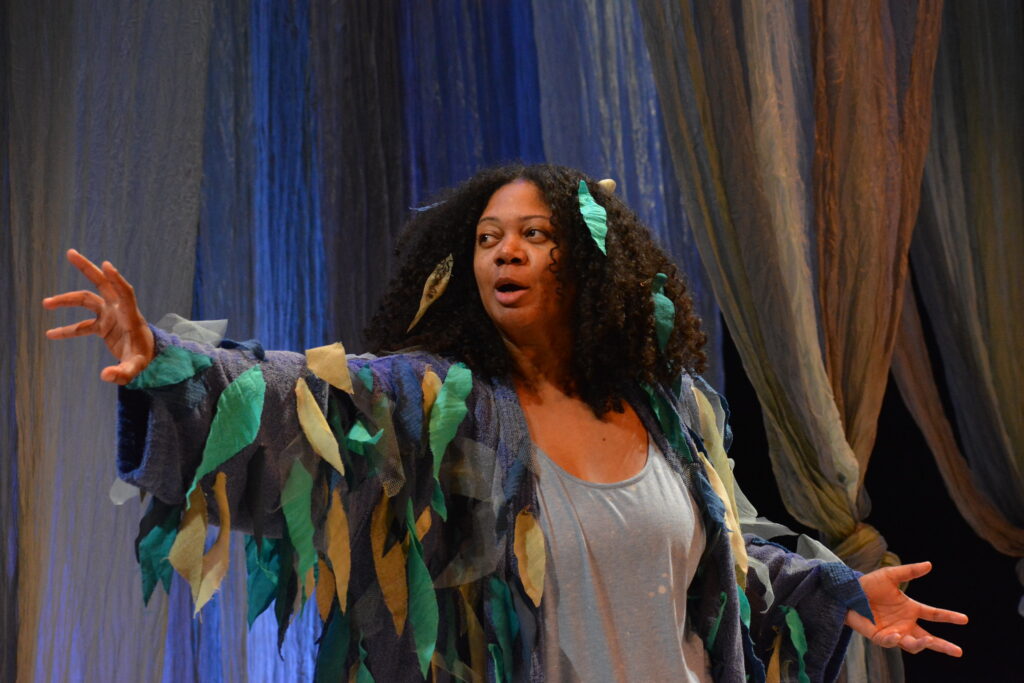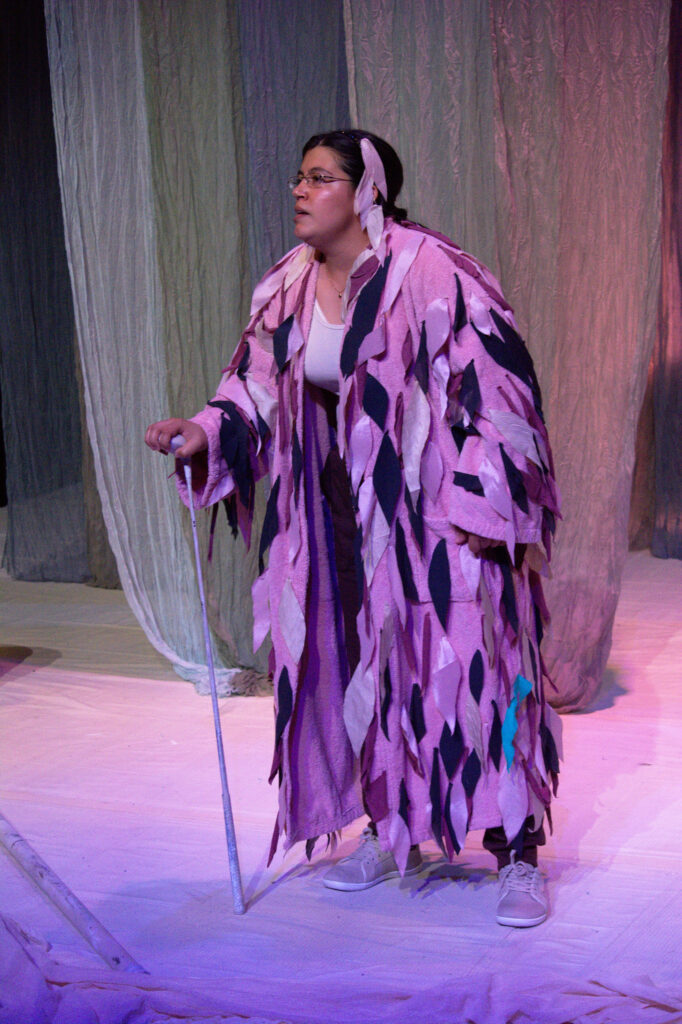A broad spectrum of emotions animates the superlative world premiere of Plan-B Theatre’s Just Add Water, directed by Penelope Caywood. At one point, the personified Great Salt Lake (played majestically by Latoya Cameron) encounters TBH who represents Brutal Honesty (Isabella Reeder, in a dazzling performance). Her words are painfully too on the nose:
Once upon a time, yeah, they called you Grandmother Water, respect, reverence, but now you’re just a liability, you’re an abstraction. If they think about you, it’s how to think less about you: build a pipeline from the ocean, line the rivers with concrete, cut down these greedy frickin’ trees takin’ our tap water, whatever, can we fix this already?

Delivering a gem of a script for the play, Matthew Ivan Bennett and Elaine Jarvik give humor, lyricism, joy, love, hope, wisdom and drama, but where the play shines the finest is its unexpected poignant moments. And, it is in those moments that tug greatest in encouraging us to muster the will to ensure that humans will not end up keeping, as TBH states so bluntly, “Grandma — in some sad, stinking, faded form — for mining, for the shrimp industry, for politicians to get their pictures taken with a snowy egret.”
Indeed, audiences are responding. The entire run, which continues through Oct. 19, has already sold out but Plan-B Theatre encourages interested theatergoers to put their name on this waitlist, as ticket spots might become available. Along with Plan-B’s Eb and Flo (also written by Jarvik for the company’s annual Free Elementary School Tour program), Just Add Water is part of The Great Salt Lake Plays, part of Wake the Great Salt Lake, a temporary art project supported by Salt Lake City Arts Council, Salt Lake City’s Mayor’s Office, and Bloomberg Philanthropies Public Art Challenge. Performances take place in the Studio Theatre at the Rose Wagner Center for Performing Arts.

Just Add Water’s genesis did not come free of risks. As noted in a preview published by The Utah Preview, two playwrights with different temperaments and creative approaches found consensus and balance on setting a story about the personified lake embarking on a hero’s journey, accompanied by a charming personification of a brine shrimp (incidentally, designated as the state crustacean for Utah). It could have ended up being a novel cute trifle bristling with comedy, ditties and satire. It also could have ended up as a melodrama tinged with a pedantic air heavy with data and information about the scientific realities and ecological challenges of a lake that is precariously close to dying.
But Just Add Water is a masterclass of synthesis and counterpoint, rounding out the contours in such a way that its audiences will leave the theater with a heightened awareness as well as a humble emotional appreciation for why saving the lake transcends the brutal truths that TBH utters. The quartet of actors throws their hearts into breathing life into the remarkable synthesis that Bennett and Jarvik have achieved. In particular, passages offering the manageable bites of science and ecological information are delivered as if they are poetic verse. The play’s internal framework is conducive to a surprisingly lyrical tone.
As the Great Salt Lake in her wounded glory who finds fresh resilience in order to stay alive and thrive, Cameron is magnificent and yet vulnerable in her regal potential. Taking on a generous variety of character roles, Alec Kalled and Isabella Reeder flesh out the depth in the ensemble and the stage action. One of many solid examples is Kalled’s take on a character representing the typical Utah legislator and the accompanying ditty (“This little lake of mine, I’m gonna let her shine”).

In addition to TBH, Reeder shines as the Journalist (a spot-on caricature) and the forgotten North Arm of the lake (an unexpectedly moving dramatic moment). Reeder is at her finest here, when she pays full respect to the lines the playwrights gave her: “The majority culture doesn’t like complicated, contingent, qualitative goals. They like cost-benefit analysis, quantities, profits, and I cost too much. They messed me up good, sister. So the hope lies in you. You’re going to take this and go stick up for yourself. Promise me.” The North Arm has accepted her fate but she has one last request to be useful to her sister, who initially demurs at it.
Along with some other minor character roles, it is Brien, the magical brine shrimp, who becomes the heart of Just Add Water. Amona Faatau is gobsmackingly good, elevating Brien to a beloved, multidimensional loyal companion to the Great Salt Lake hero. Faatau’s emotions are genuine throughout, with the most touching coming near the end of the play when the Lake tells Brien to return to his brine shrimp family. The Lake repeatedly insists that Brien need not worship her, but Brien feels otherwise: “My life will be less long than yours, but I shall always worship you. The cradle of your mud; the arms of your wind-swept waves; the —.” It is the play’s most tender moment.
Can Just Add Water make us feel hopeful? Near the end, the Lake says, “I feel a little more saved.” In his 2024 book, Life after Dead Pool: Lake Powell’s Last Days and the Rebirth of the Colorado River, journalist Zak Podmore referenced a quote by Wendell Berry, farmer, novelist and environmental activist, who said that there are no unsacred places on the planet but only those that are sacred and desecrated. Podmore also recalled that in one meeting to discuss which spaces should be conserved because of their sacredness, Hopi elders presented an image of Earth taken from space.

“I will never fathom what it was like for the Diné, Hopi and Paiute people who watched their sacred sites drown,” Podmore wrote. “The filling of Lake Powell was the ultimate desecration. It turned a flowing river into a putrid slackwater, which for a time flooded under the magnificent stone rainbow and contaminated its base with the rainbow scuzz of leaking motor oil.” In his most positive expression, Podmore wrote that desecration was neither total nor final: “Glen Canyon contains too much beauty for one dam to destroy. When the reservoir is eventually drained, the living river will return. May that day come, and may it be beautiful.”
At the beginning of Just Add Water, the Great Salt Lake is ready to give up and die, realizing that the human hubris of dominion might be too much to overcome and reverse her own desecration. But it is Brien, the personified brine shrimp, who memorably reminds us that we can accept a humble mantle as stewards, aware that injuries and injustices can be healed and reconciled and that the Great Salt Lake can be consecrated anew to becoming beautiful again.
